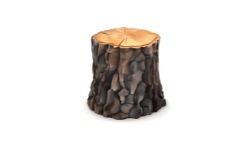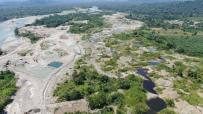
With the collaboration of Aramis Castro and Gianfranco Huamán
Loreto is the largest and most important Amazon region in Peru. In this region of vast primary forests, located on the border with Brazil and Colombia, since November 2015, three environmental prosecutors' offices have been investigating the company Inversiones La Oroza, in addition to 10 other timber companies, for the alleged crime of illegal timber trafficking. During that month, forest authorities seized 1,300 cubic meters of wood (the equivalent of 60 cargo trucks) on the Yacu Kallpa ship, just as the shipment was about to leave the port of Iquitos, cross the Amazon River, and head out into the Atlantic to Mexico and the United States. Ninety-seven percent of the wood that this ship was carrying was of illegal origin.
Today, three Peruvian prosecutors are ready to present their indictments against the companies involved, Julio Guzmán, the special state attorney from the Ministry of the Environment, confirmed to OjoPúblico. There are a total of 52 prosecution files, involving 11 logging companies and 125 people, including workers and legal representatives of the companies. The Specialized Environmental Prosecutor's Office of Maynas (Loreto), headed by Yusen Caraza, is in charge of 35 prosecution files. The Nauta Prosecutor's Office, headed by Prosecutor Félix Castro, has an additional 15 files. The other two are under the responsibility of the Specialized Environmental Prosecutor's Office of Alto Amazonas.
Of all the wood that the Yacu Kallpa carried, Inversiones La Oroza owned 80%. The wood that was confiscated did not come from the company's concessions but instead had been bought from third parties. "The field inspections proved that they had used forest transport permits to move illegal wood and that it did not correspond to the concessions they presented," summarizes Rolando Navarro, former head of the Forestry and Wildlife Resources Oversight Agency (Osinfor).

____
Company granted more concessions
Despite the criminal investigation underway and the fact that the Yacu Kallpa case is one of the most emblematic in the fight against global trafficking of Amazon timber, between 2016 and 2019, the Regional Government of Loreto granted Inversiones La Oroza five additional forest concessions in the districts of Mazán, Las Amazonas and Indiana, in the province of Maynas. OjoPúblico had access to both information and records confirming that the concessioned areas correspond to 177,285 hectares of forest, granted for a period of 40 years.
Until 2015, when the Yacu Kallpa intervention took place, the company had only one concession of 17,014 hectares, located in the district of Indiana (Las Amazonas). This was granted in 2004 by the former Technical Forestry and Wildlife Administration (ATFF) of Loreto. The concessions granted between 2016 and 2019 were made after the Yacu Kallpa case and at the beginning of the investigation into the company for its illegal trafficking of wood.
In 2017, La Oroza was banned by the U.S. government from exporting wood for entry into the U.S. However, that same year, the company obtained two concessions from the former executive director of Forestry and Wildlife of Loreto, Rildo Rojas Tuanama, during the administration of then-Regional Governor Fernando Meléndez Celis. Meléndez Celis is currently a congressman for Alianza Para el Progreso and faces an investigation for alleged environmental crimes linked to the Tamshi case (on deforestation). A year earlier, the regional government of Loreto had granted another concession to La Oroza, of almost 7,000 hectares, in the district of Las Amazonas, province of Maynas.

QUESTIONED. The Regional Government of Loreto delivered five concessions to La Oroza, since 2016, despite the fact that it was investigated for timber trafficking.
Photo: OjoPúblico/ Jorge Carrillo
The other two concessions were granted last year and were endorsed by the current regional manager of Forestry and Wildlife Development, Kenjy Teran Piña. This official has been under investigation since 2010 by the Specialized Environmental Prosecutor's Office of Loreto in four criminal proceedings, different from those of La Oroza, for the crimes of illegal trafficking in timber and illegal granting of land use rights. The current regional governor of Loreto is Elisbán Ochoa Sosa, of the Restauración Nacional party.
When asked why his office had given forestry concessions to a company under investigation, Teran Piña told OjoPúblico that it had done so because "in this case [although the company] is under investigation (...) it did comply with all the requirements: it has financial capacity, technical capacity, no judiciary sentences against it, and no obstacles. According to the requirements, it cannot be handed over only if it has been declared guilty in court. But that has not happened.”
For the special state attorney of the Ministry of the Environment, Julio Guzmán, "Loreto is the region that provides the most wood of illegal origin in our country.” The official stressed the importance of forest managers in the Amazon in the fight against illegal logging. "Unfortunately, almost all of them are being investigated for environmental crimes. And, where there is less institutionality and transparency, corruption is rife," he said.
Regarding the fiscal investigations into his own actions, Kenji Teran said he is seeking the statute of limitations for the cases, as it has been more than 10 years since the offenses in question occurred. "In another investigation that the prosecutor Caraza (of the Environmental Prosecutor's Office) has opened, I hope that the case will be closed, and then I will sue the (local) reporter who spread that information [complaint for illegal granting of rights of use]," he said.
Julia Urrunaga, Peru Director at the Environmental Investigation Agency (EIA), is of the opinion that regional governments should investigate the capacities of the companies to which they grant concessions. "If they see that they have concessions that have been cancelled, expired, or mismanaged, then they should not grant them anymore," she said.
In August of this year, the Ministry of Culture reiterated its request for the annulment of 78 forest concessions granted since 2004 by the Loreto Regional Government that overlap with forest reserve areas currently being created for the benefit of Indigenous peoples living in voluntary isolation, known in Peru as PIACI.
One month before, the Regional Organization of Eastern Indigenous Peoples (ORPIO) submitted a protective action against the Regional Management Office of Forestry and Wildlife Development and the Regional Government of Loreto, entities that are promoting the economic reactivation of forest concessions overlapping with the territory set aside for the creation of these Indigenous reserves in the midst of the current economic downturn.
In November of this year, the Regional Management Office of Forestry and Wildlife Development of Loreto announced that it included 169 forest concessions in a pandemic-induced economic reactivation project. Three correspond to La Oroza. However, one of them overlaps with an area being created as an indigenous reserve and was excluded. The other two (granted in 2017) did go through in the end.
New destinations, Fewer sales
Neither the ongoing investigations nor the ban on exports to the United States since 2017 has prevented La Oroza from continuing to export wood. OjoPúblico built a database from Customs information with the exports of the 11 companies investigated by the Environmental Prosecutor's Offices in Loreto in the Yacu Kallpa case and found that while most of them had reduced their timber shipments since the November 2015 seizure, several continued to export to other countries.
La Oroza, whose legal representative since 2019 is Luis Angel Ascensio Pomasunco, exported between US$ 5 million and S/. 6.8 million annually in the period between 2012 and 2015, while in the two following years it shipped less than US$ 1 million.
Until 2014, one year before the historical operation in the Yacu Kallpa ship, the United States was one of the main international markets of this firm. However, in October 2017, the U.S. government prohibited the entry of wood from La Oroza into its territory, and the firm has redirected its commercial activities to the markets of Mexico, the Dominican Republic, and China.
Despite repeated sanctions and being investigated for the alleged crime of illegal timber trafficking, Inversiones La Oroza also obtained four contracts with the state between 2017 and 2019 for a total of S/. 22,800. The company was a supplier of dry wood to the Maynas Center for Productive Innovation and Technology Transfer (CITE) in Loreto, which is part of the Technological Institute of Production, an entity that falls under the purview to the Ministry of Production. Additionally, in September 2017, La Oroza sold wooden desks to the Binational Project for the Integral Development of the Putumayo River Basin.
The other companies involved in the Yacu Kallpa case are Inversiones WCA E.I.R.L., Corporación Inforest MC S.A.C., Scavino Maderas E.I.R.L., Corporación Industrial Forestal S.A.C., Triplay Iquitos S.A.C., Sico Maderas S.A.C., Maderas Impregnadas Tropicales S.A.C., Madex E.I.R.L., Laminados y Manufacturas de Madera S.A.C., and Corporación Maderera Loreto S.A.C.
Inversiones WCA, whose legal representative, according to the National Superintendency of Tax Administration (Sunat), is William Castro Aramingo, went from exporting US$ 4.4 million, in 2015, to US$ 1.5 million the following year. Its exports had sunk to US$ 630,000 annually by 2019. Currently, its main foreign markets are Mexico, Puerto Rico, and Chile. In July 2019, the United States government prohibited the entry of forest products from this company to its territory, due to suspicions of illegal wood in its supply chain.
On the other hand, Corporación Inforest MC, whose legal representative is Jhonny Correa Tanchiva, was also hired by the Peruvian State for a total of S/ 256,227 between 2015 and 2018. This was mainly in working with Servicio Industrial de la Marina S.R.L. of Iquitos, the Provincial Municipality of Virú (La Libertad) and the Regional Government of Loreto. During that same period, it also exported wood to Mexico for a total sum of US$ 1.6 million.
OjoPúblico reached out to the companies La Oroza, WCA, Inforest and Corporación Industrial Forestal, but as of the time of writing, has yet to receive a response.
____
Sanctioned by Osinfor
In addition to being investigated for alleged timber trafficking in the Yacu Kallpa case and being blocked from exporting to the United States, Inversiones La Oroza has been sanctioned by the Forestry and Wildlife Resources Oversight Agency (Osinfor) for extracting and transporting unauthorized wood within one of its concessions. According to the resolutions that OjoPúblico accessed, the company was fined five times, between 2013 and 2018, for violating the forest law and its regulations. The total fine amounts to 10 Tax Units (UIT), equivalent to S/ 35,000.
The first sanction was registered two years before the seizure of the Yacu Kallpa case, in August 2013. According to Directorial Resolution No. 318-2013-OSINFOR, it originated from the extraction and mobilization of "unauthorized timber resources of cedar (91,124 m3) and cumala (23,585 m3)" and the felling of two seed trees. On that occasion, the fine was 3.7 UIT, which that year amounted to S/ 13,690; this amount was paid by the company.
In October 2015, Prosecutor Liz Macedo Dávila of the Specialized Environmental Prosecutor's Office of Loreto-Maynas decided not to open a preliminary investigation against La Oroza for the alleged crime against forests or wooded areas, arguing that Osinfor did not send her the resolution that initiated their administrative procedure (PAU) or the resolution declaring the sanction against the company to be final.

SANCTION. In 2013, Osinfor fined La Oroza for the first time for infractions of the Forest Law regulations.
Photo: Osinfor
Two years later, in August 2015, La Oroza was again sanctioned with 2.2 UIT, for extracting and transporting timber species (andiroba, tornillo, and lupuna) without authorization, and for felling seed trees and other resources that did not meet the minimum diameter regulations for cutting. Directorial Resolution No. 3412015- OSINFOR further details that, on that occasion, the company used its concession to transport 252,010 m3 of unauthorized wood and used its forestry transport permit to "give the appearance of legality" to resources coming from unauthorized trees.
The sanction also included a measure preventing the company from taking advantage of three forestry units in its concession in Loreto. However, the company filed a petition for reconsideration, which was declared well-founded. In this way, La Oroza continued to harvest the 17,014 hectares of the three forestry units included in the sanction.
In its defense, the company reported that it paid the fine of S/. 5,968, corresponding to 1.55 UIT, and was discounted 30% for prompt payment. That year, once the administrative phase was concluded, the Specialized Environmental Prosecutor's Office of Loreto opened a preliminary investigation against the company for the alleged crime against forests or wooded areas (for extracting and transporting trees without authorization). This investigation remains ongoing, as has been confirmed by OjoPúblico.
In March 2016, La Oroza was once again fined 2.1 UIT for extracting unauthorized wood (andiroba, lupuna, and marupa), cutting a seed tree and wood in excess of its management plan, as well as unauthorized forest resources. On that occasion the penalty was also reduced to 1.48 UIT (S/ 5,846) for prompt payment.
The following year, Resolution 046-2016-OSINFOR warned that the company again used forest permits to give the appearance of legality to volumes of wood coming from trees without authorization for forestry use. It also warned that "lupuna [one of the affected resources] is on the list of threatened species, so its use without management criteria puts its existence at risk.”

BENEFIT. In 2018 La Oroza was fined 20 UIT, but said sanction was lowered to 1 UIT, after he filed an appeal.
Photo: Osinfor
That same year, the lumber company was again sanctioned for altering the activity report of the Annual Forestry Operations Plan (POA) to prevent proper inspection of the forest products. This time, the fine was 1 UIT, and was paid by the company, as were the previous ones.
In July 2018, La Oroza was once again fined by Osinfor for extracting and transporting 68,664 m3 of unauthorized wood (tornillo, marupa, and cumala). Directoral resolution 375-2017-OSINFOR originally contemplated a fine of 20 UIT against the company - an amount which was later reduced to 1.1 UIT - and the replacement of 117 trees felled without authorization.
The aforementioned reduction occurred in December 2017, when the company filed an appeal, which was declared unfounded six months later. However, the Osinfor Tribunal accepted the readjustment of the value of the fine, according to a new calculation methodology, approved by Osinfor in February 2018. Even so, according to the administrative file to which OjoPúblico had access, the firm did not make the payment.
____
Protect the international market
Despite this history of sanctions, recidivism, and investigations accumulated since 2015, last year the regional government of Loreto granted it two more forest concessions. And even this year, in the midst of the Covid-19 health crisis, the Banco de Crédito granted a loan from Reactiva Perú (the state support program) of S/. 1,364,258 to La Oroza.
When asked about the commercial blockade imposed by the United States on La Oroza, the current regional manager of Forestry and Wildlife Development in Loreto, Kenji Teran, said that "it is not the only [timber export] market. It is in third place... It is not the ideal market for tropical woods. The Asian market is the strongest.”
However, Julia Urrunaga of EIA stated that "China imports wood from Peru and re-exports it to the United States and Europe and is now changing its legislation. If they trace their wood, then we will have problems.”
César Ipenza, an environmental lawyer, explained that the U.S. blockade of La Oroza affects Peru's image. "We shouldn't think that the solution is to export to China, because the forestry law there is changing. We shouldn’t be surprised that in the not-too-distant future they will also close the doors on us," he said with concern.
 Tienes reportajes guardados
Tienes reportajes guardados

















